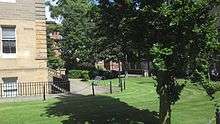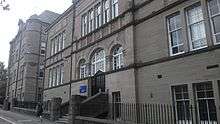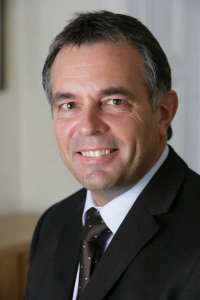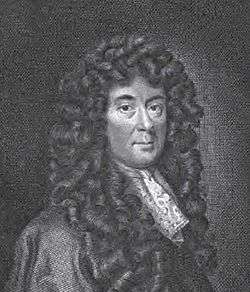Dundee Law School
Coordinates: 56°27′25″N 2°58′41″W / 56.457°N 2.978°W
|
The Scrymgeour Building | |
| Type | Law School |
|---|---|
| Established |
1967 - school of independent university 1952 - faculty of Queen's College 1899 - faculty of University College[1][2] |
| Head of School | Professor Stuart Cross[3] |
| Students | 600 approx. |
| Location | Dundee, Scotland |
| Affiliations | University of Dundee |
| Website | www.dundee.ac.uk/law |
The Dundee Law School at the University of Dundee, Scotland provides undergraduate and postgraduate teaching in Scots and English Law. It is the only institution in the United Kingdom to permit students to qualify into all three UK legal jurisdictions. It is based in the Scrymgeour Building—named for Henry Scrymgeour, a 16th-century legal philosopher from Dundee—the Law Library is based in the libraries building, both on the university's main campus. An internal reorganisation at the university in 2015 led to the Law School becoming part of the School of Social Sciences.
History

The origins of the law school begin with the foundation of the University of St Andrews, around 1413. A group of Augustinian clergy, driven from the University of Paris by the Avignon schism and from the universities of Oxford and Cambridge by the Anglo-Scottish Wars, formed a society of higher learning in St Andrews, which offered courses of lectures in subjects including law. Through several centuries the teaching of law in St Andrews was incorporated into St Mary's College at the University of St Andrews. By the late 1800s, St Andrews was contending with geographic isolation and dwindling numbers of students, whilst a university college was burgeoning in nearby Dundee. Law lectures had commenced in Dundee in January 1866.[4] Following several aborted attempts at various forms of incorporation and association, in 1890 the university college began to establish closer links with the University of St Andrews and it was incorporated into the university in 1897. The campus in Dundee later became known as Queen's College, with the teaching of law formally transferred to Dundee in 1952. In 1967, the independent University of Dundee was created by Royal Charter, incorporating the former Queen's College, including the School of Law. St Andrews became, and remains, the only ancient university not to offer the study of Law.
Today
Dundee Law School consistently ranks as one of the top law faculties in the UK. In The Guardian's 2018 law league table, Dundee is ranked 1st in Scotland and 6th in the UK.[5] In the previous year, The Guardian's 2017 league table placed it 1st in Scotland and 8th in the UK.[6] Similarly, in The Times' 2017 law rankings, the School was ranked 1st in Scotland and 10th in the UK.[7]
In the 2014 Research Assessment Exercise the School was one of only two law schools in the UK to have 100% of its research rated as being of 'international standard'. The school is the only law school to have achieved that feat in both the 2008 and 2014 Research Assessment Exercises.[8]
Initiatives

Dundee International Law Society
Dundee International Law Society is a student-led society made up of current and former Dundee University students, faculty members as well as scholars and friends from across the wider legal and academic community. The Society represents one of several linkages between the School of Law and the Centre for Energy, Petroleum and Mineral Law and Policy. Dundee International Law Society organises regular seminars, colloquia, debates, roundtables and presentations on a wide range of international law problems and prospects, and serves as an informal society for analysis of international law questions both great and small. Practitioners, academics and students are invited to attend, to participate and to present papers or lead discussions.
Dundee Student Law Review
The law school publishes a student law review bi-annually. The review offers the first chance for most students to publish their academic writing.
Dundee University Student Bar Society
Dundee University Student Bar Society was established to encourage students wishing to enter the Bar in either Scotland, Northern Ireland or England and Wales. The Bar Society's inaugural lecture took place on 7 November 2014 and was delivered by David Hope, Baron Hope of Craighead. The Honorary President of the Bar Society is Dundee alumnus Donald Findlay Q.C..
Law Clinic
The student-run Law Clinic offers free legal advice and help to residents of Dundee, including both the local and student populations, who cannot afford a solicitor and do not qualify for legal aid. The Law Clinic became operational on 31 January 2011, and currently runs from 9am-5pm every Wednesday and Thursday in the Centre of Dundee (Commercial Street, Dundee. Entry via Boyle's Chambers and ask for the Law Clinic at reception). The Law Clinic offers free legal advice on issues such as landlord and tenant, small claims, benefit disputes and employment. It can also provide services as a "McKenzie friend".[9]
Law Society
The long running student law society organises social- and careers-events for Dundee law students. Several traditional social events take place each year, including a Gaudie Night where first year students are assigned 'parents' from older years, with whom they must survive the night and who will then act as academic and social mentors. The law society also runs an annual pub quiz which is typical attended by teams of academics from within the School, and hosts an annual law ball at different ornate locations around Scotland. The law society further coordinates the School's sports teams which compete in inter-varsity matches against law schools from elsewhere in the United Kingdom, in sports such as football, basketball and hockey.
Mooting
The law school has an active mooting society, which organises an internal competition and competes in various Scottish and UK external competitions. The Honorary President of the Mooting Society is Lord Justice Jones. The Mooting Society bases itself at the moot court room located within the School's premises at the Scrymgeour Building. In 2013/14, the Mooting Society entered the Alexander Stone Moot, the Inner Temple Inter-Varsity Moot, the ESU/Essex Court Moot, the NSLS Moot and the OUP/BPP National Moot. Out of these competitions, the Dundee team made it to the semi-final of the Inner Temple Inter-Varsity Moot and the final 16 teams in the ESU/Essex Court Moot. Furthermore, three of the Society's undergraduates represented Scotland in the 37th Edition of the Telders International Law Moot Court Competition held at the Peace Palace in the Hague, Netherlands. The Dundee team participated in the "Roundsian Rescue Dispute" together with another 27 teams from 26 countries across Europe, and were named "Outstanding Team".
Academics
Undergraduate

The University of Dundee has the distinction of having the only law school in the United Kingdom to offer qualifying Bachelor of Laws (LL.B.) degrees in both Scottish and English/Northern Irish Law. Both LL.B. degrees can also be taken as Law with Languages degrees in French, German and Spanish. Dundee pioneered the 'dual qualifying' degree in Scots and English Law which has since been rolled out at other Scottish institutions.
Admission to the school is selective; for undergraduate degrees an average of 900 applications are received per year for approximately 125 places.[10][11] Dundee Law School traditionally has a tight-knit staff and student body with around a third of the numbers of students at Glasgow and Edinburgh law schools and half of those at Aberdeen.
Postgraduate
At postgraduate level, the University offers a wide range of Master of Laws (LL.M.) courses. Undergraduate and Postgraduate teaching in energy and minerals topics is delivered in conjunction with the University's Centre for Energy, Petroleum and Mineral Law and Policy, and the UNESCO Centre for Water Law, Policy and Science.
Notable alumni




- Professor Zenon Bankowski, Professor Emeritus of Legal Theory at the University of Edinburgh
- David Burns, Lord Burns, Senator of the College of Justice
- Sir Colin Campbell DL FRSA, former Vice-Chancellor of University of Nottingham
- Colin Campbell, Lord Malcolm, Senator of the College of Justice
- John Campbell, 1st Baron Campbell PC QC FRSE, Scottish Liberal politician and judge
- Christopher Chope Member of Parliament, former Minister of State and barrister
- Lynda Clark, Baroness Clark of Calton, former Member of Parliament and Advocate General for Scotland, now Senator of the College of Justice
- William Cullen, Baron Cullen of Whitekirk KT FRSE FREng, Advocate, Lord Justice General and Law Lord as well as life peer
- Thomas Dawson, Lord Dawson, former Solicitor General for Scotland and Senator of the College of Justice
- Kurt Deketelaere, Secretary-General of the League of European Research Universities
- William Kirk Dickson , Advocate, librarian and writer, Keeper of the Advocates' Library and Librarian of the National Library of Scotland
- Frank Doran, Member of Parliament for Aberdeen North
- Kevin Dunion OBE, Scottish Information Commissioner (2003–12), as well as former Lord Rector of the University of St Andrews
- Tim Eicke QC, Judge of the European Court of Human Rights
- David Erskine, Lord Dun, Judge and MP for Forfarshire
- Donald Findlay QC, criminal defence advocate and honorary chairman of Dundee University Student Bar Society
- Maurice Golden MSP, current Shadow Cabinet Secretary for the Environment, Climate Change & Land Reform
- Grant Johnson, former professional footballer and tutor in Private Client Law at the School
- Michael Jones, Lord Jones, Senator of the College of Justice and Honorary President of the School mooting society
- Walter Kamba, Rhodesian lawyer and Chancellor of University of Zimbabwe
- Alhaji Shehu Ladan, Nigerian lawyer
- William Lamb, Cleric, lawyer, author, and Senator of the College of Justice
- Professor David Lessels, Senior Lecturer in Law at the University of Aberdeen
- John S. Lowe, visiting professor at the University and expert in energy law
- Neil MacCormick QC FBA FRSE, professor of jurisprudence at the School and legal philosopher
- Finlay Macdonald, retired minister and Principal Clerk to the General Assembly of the Church of Scotland
- Ronald Mackay, Lord Eassie, judge, former chairman of the Scottish Law Commission and Senator of the College of Justice
- George Mackenzie, Lord Advocate and legal writer
- Jenny Marra MSP, read the Diploma in Professional Legal Practice
- Duncan McNeill, 1st Baron Colonsay FRSE, Tory politician, Lord Justice General and Lord President of the Court of Session
- Claude Moraes, former Commissioner for Racial Equality, now Member of the European Parliament
- Robert Moray, judge, diplomat and natural philosopher
- Elijah Ngurare, Namibian politician, Secretary General of the SWAPO Party Youth League
- Nhial Deng Nhial, Minister of Foreign Affairs for the Republic of South Sudan
- Kenneth Norrie FRSE, eminent professor of Scots Family Law and Delict Law, head of department at Warwick University and former chair at King's College London
- Professor Peter Robson, professor of social welfare law at the University of Strathclyde
- Thomas Shaw, 1st Baron Craigmyle PC KC , Scottish Liberal politician and judge
- Jim Spence, sports broadcaster
- Alan Turnbull, Lord Turnbull, Senator of the College of Justice
- Evadne L. Wade-Garcia, author and director of the Geology and Petroleum Unit in Belize’s Ministry of Science, Technology and Transportation
- Iain Walker, British diplomat serving (since February 2017) as High Commissioner to Ghana
See also
References
- ↑ "Records of University College, Dundee". Retrieved 9 August 2017.
- ↑ "Town, gown and traditions". Retrieved 9 August 2017.
- ↑ http://www.dundee.ac.uk/law/staff/profile/pure/stuart-cross/19e312f6-6eac-4f10-abfd-070fa7447899
- ↑ http://www.dundee.ac.uk/law/news/2016/article/dundee-law-school-sesqui-centenary.php
- ↑ "Guardian University Guide 2018: Law league table". Retrieved 16 May 2017.
- ↑
- ↑ Dundee, University of. "Top In Scotland : Law : University of Dundee". www.dundee.ac.uk. Retrieved 2016-09-28.
- ↑
- ↑ McKenzie v. McKenzie [1971] P 33; [1970] 3 WLR 472; [1970] 3 All ER 1034, CA
- ↑ "UCAS Acceptance Statistics". Retrieved 15 March 2017.
- ↑ "UCAS Application Statistics". Retrieved 15 March 2017.


.svg.png)